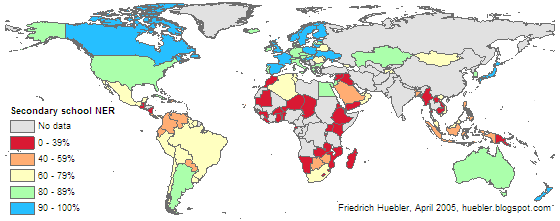The map below was created with data from the Global Education Digest 2004. The most recent estimates are for 2001/02. Of 51 countries with a secondary NER of 80% or higher, 32 are industrialized countries, seven are in Latin America and the Caribbean, and six are in Eastern Europe. Only six countries outside of these regions have secondary net enrollment ratios at a comparable level: Bahrain, Egypt, Jordan, and Palestine (NER 80 to 81%); Niue (94%); and the Seychelles (98%).
Secondary school net enrollment ratio, 2001/2002

Data source: UNESCO Institute for Statistics (UIS). 2004. Global Education Digest 2004. Montreal: UIS.
For many countries in Africa and Asia, the secondary school NER is not known. However, the data for the remaining countries is not encouraging: fewer than four out of ten children have the opportunity to attend secondary school in large parts of Africa and South-East Asia. The lowest enrollment rates are reported for Niger (secondary school NER 6%); Chad, Burkina Faso, and Burundi (8%); Mozambique (11%); Madagascar and Guinea (12%); Uganda (14%); Mauritania and Ethiopia (15%); Djibouti (17%); and Liberia (18%).
A comparison with data on primary school enrollment makes clear that most children in South-East Asia at least attend primary school. Most African children have no formal education at all, not even at the primary level. In Latin America, most children attend primary school but fewer continue their education at the secondary level.
Friedrich Huebler, April 2005, Creative Commons License
No comments:
Post a Comment